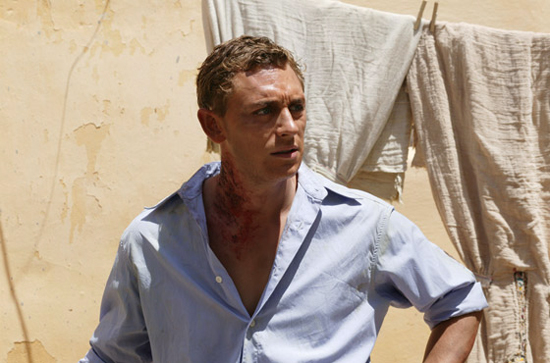|
Reviews of Recent Independent, Foreign, & Documentary Films in Theaters and DVD/Home Video
Directed by: Elie Chouraqui. Produced by: André Djaoui, Elie Chouraqui, Jean-Charles Levy, Jean Frydman & Andreas Grosch. Written by: Elie Chouraqui & Didier Le Pêcheur, based on the book by Larry Collins and Dominique Lapierre. Director of Photography: Giovanni Fiore Coltellacci. Edited by: Jacque Witta & Franck Nakache. Music by: Stephen Endelman. Released by: Samuel Goldwyn Films. Language: English and Arabic with English subtitles. 102 min. Rated R. Country of Origin: France/UK/Italy/Greece/Israel/USA. With: Saïd Taghmaoui, JJ Feild, Maria Papas, Patrick Bruel, Mel Raido, Tom Conti, Peter Polycarpou, Ian Holm & Tovah Feldshuh. In 1946, the aftershocks of World War II reverberate around the world. Returning Jewish soldier Ben Goldman (played by handsome JJ Feild with a wavering American accent) and Palestinian student Saïd Chahine (Saïd Taghmaoui) meet cute in the middle of a New York City street, listening to the shocking radio news from a car of the Irgun’s terrorist attack against the British at Jerusalem’s King David Hotel. Even as they argue about who has the right to Palestine, based on ancient or current settlement, their friendship grows from a mutual interest in archaeology. Both are fictional composites of the many young people who figured in Larry Collins and Dominique Lapierre’s detailed recounting of what propelled the drama in Jerusalem from November 29, 1947 to July 17, 1948 as the United Nations partitioned the Holy Land, Britain withdrew, Israel declared statehood, and divergent groups of Jews and Arabs, from religious to radical, set new boundaries with blood. Straining credulity through constant coincidences and stiff expository dialogue, the script pulls the two young men to Palestine. Saïd has to return home to his uncle, revered leader Abdul Khader Husseini, while Ben follows a Zionist friend and rises through the ranks of the Haganah, Israel’s proto army, to participate in battle across from Saïd. While the island of Rhodes is very effectively used to stand in for the Jerusalem area, the cinematographic technique of blending archival footage into black-and-white recreations mostly works, except when some scenes then inconsistently fade into brownish tints and others into full color. Despite occasional, awkward narration, the most dramatic sequences are taken directly from the book’s eyewitness accounts. Some incidents are amalgamated from different locales or physically moved, such as the Arab League meeting in the Jordanian desert, rather than in either Cairo or Amman, where Golda Meir secretly tried to negotiate a peace deal with King Abdullah. (Tovah Feldshuh briefly plays Meir for the third time in her career.) Some important background gets short shrift, such as the British pro-Arab attitude represented only by a passing comment by Sir Alan Cunningham (Tom Conti), the last high commissioner of Palestine, and the Israelis’ gear is labeled “USA” without explanation of how they purchased surplus war goods. Both stories are key intrigues in a book that is more thrilling to read, even 35 years after its publication, than this movie is to watch. Oddly missing are any maps, except for a dusty line drawn on a bus window showing the vital route from Jerusalem to the sea. Also left out is a point Collins and Lapierre stress and was reiterated in Ilan Ziv’s recent documentary, ‘Six Days’ June 1967: The War That Changed The Middle East, that serves as a sad sequel to this film – the danger of leaders believing their own propaganda, whether the Arabs in 1947 and again in 1967, or the Israelis looking back to these wars instead of the situation now.
Director Elie Chouraqui ably handled war and violence in Harrison’s Flowers, but he lets the melodrama take over every scene here, including
when he plays a Jerusalem defender. He’s not helped by Stephen Endelman’s score, which is even more intrusively sappy than his music for
Home of the Brave and oddly has only faint Middle Eastern touches. The 60th anniversary of these events cries out for the contemporary
docudrama techniques of Paul Greengrass in United 93 and Bloody Sunday or Michael Winterbottom’s A Mighty Heart and
In This World, instead of this remake of Otto Preminger’s Exodus, expanded to include more Arab viewpoints.
Nora Lee Mandel
|

